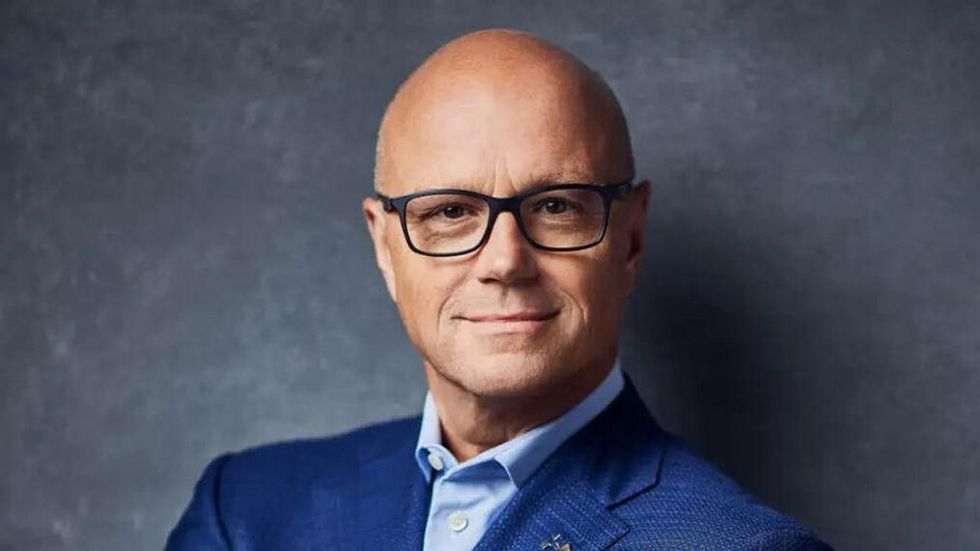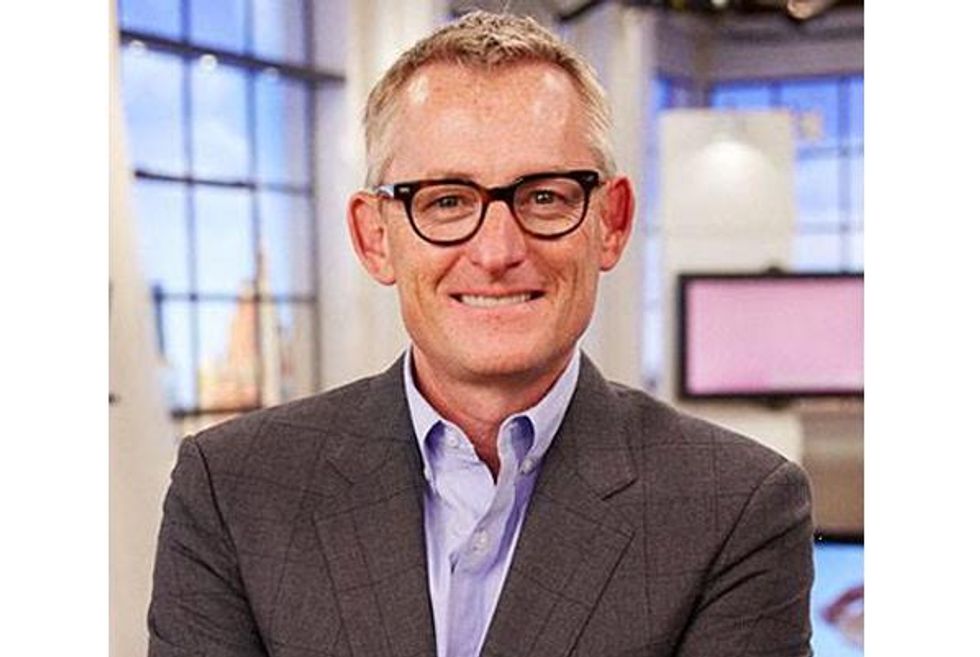Careers
24 May 2022
On the Move: CEO shifts at Glossier, Under Armour, Thinx and more
Check out the latest hiring and departure news in ecommerce and consumer goods.

(Illustration by The Current)
Check out the latest hiring and departure news in ecommerce and consumer goods.

(Illustration by The Current)
Welcome to On the Move. In this hiring-focused weekly feature, The Current is rounding up recent arrivals and departures at brands and retailers across the ecommerce landscape.
This week, top apparel and DTC brands are set to see new leaders. Plus, Estée Lauder and L’Oréal USA make key digital appointments, and Hasbro elevates a chief people officer.
Check out this week’s roundup:

Kyle Leahy and Emily Weiss. (Photo via Glossier)
Glossier Founder Emily Weiss will be moving on from the day-to-day leadership role of CEO, taking a role overseeing the board as executive chairwoman, according to a blog post from the company.
Chief Commercial Officer Kyle Leahy, who is a former executive at Nike, Cole Haan and American Express, will assume the CEO role at the prominent DTC beauty brand.
Glossier Chief Marketing Officer Ali Weiss is also set to leave her position, Bloomberg reports.
Weiss founded Glossier in 2014, launching a beauty brand to sell cosmetics out of the success of her blog Into the Gloss. It became a trendsetter, while forging a path for a direct-to-consumer business model in the beauty industry. But after setting out to build a tech platform in recent years, the brand shifted strategy and laid off one-third of its corporate team, or more than 80 people, this year. For further reading, a recent Bustle profile charted the rise of Glossier under Weiss.

Meghan Davis is CEO of Thinx. (Courtesy photo)
Thinx will have a new CEO next month.
Meghan Davis, an executive at Johnson & Johnson, is set to succeed Maria Molland in the leadership role of the period underwear brand.
Davis brings more than 20 years of experience in health and beauty. She served as J&J’s country director for consumer health in Portugal, Northern Europe marketing director for the consumer division, and regional marketing manager for beauty in North America.
Molland is stepping down to spend more time with her young children. In a statement, she called the job “the best I’ve ever had.”
"This was not an easy decision but one that I know is right for me personally. It has been a privilege to serve the Thinx community of customers and work with an amazing group of talented people,” Molland said. She will remain with the company until June 30 to assist with the transition.
The leadership shift comes after Kimberly-Clark acquired a majority interest in Thinx in February.

Under Armour CEO Patrik Frisk. (Courtesy photo)
Patrik Frisk is set to step down as CEO of Under Armour on June 1, the company announced.
Frisk joined the Baltimore-based apparel brand in 2017 and rose to the CEO role in 2020, after founder Kevin Plank stepped down.
The company said it is conducting an “internal and external search process” for the next CEO.
Colin Browne, the company’s COO, will serve as interim CEO, Browne is credited with modernizing the company’s DTC strategy and supply chain organization. He has served as COO since 2020, overseeing supply chain, IT, go-to-market strategy, distribution and more.

Doug Howe (Photo via Kohl's).
Two C-level executives at Kohl’s departed the retailer, CNBC reported last week.
Chief Merchandising Officer Doug Howe and Chief Marketing Officer Greg Revelle are departing the company. The moves were made as the company is reportedly searching for a buyer.
In a securities filing, the company said it is conducting a search for a replacement, and added that, “We have a deep bench of marketing and merchandising talent that will ensure the continued execution of our strategies.”
Before the week was over, Designer Brands announced that Howe will be the new president of DSW Designer Shoe Warehouse, leading day-to-day operations. Prior to Kohl’s, Howe held leadership positions at Qurate Retail Group, Old Navy, Walmart and May Department Stores.

Heiko Schäfer. (Photo via Hugo Boss)
Swiss outdoor company Mammut Sports Group named Heiko Schäfer as CEO, effective September 1. Schäfer most recently served as COO of Hugo Boss, and previously held leadership positions at Tom Tailor Group and adidas. A news release announcing the move touted his “deep understanding of brand dynamics in a digital environment.”
“I am very happy to return to the world of sporting goods and to work for the iconic outdoor brand Mammut,” Schäfer said in a statement. “I will focus all my energy and passion on working with the team to unlock Mammut's full potential to make the brand even more attractive and accessible to mountaineering enthusiasts."

Damien Huang. (Courtesy photo)
Last week, On the Move reported on the news that Damien Huang departed the role of CEO at Eddie Bauer. This week brings an announcement about his next destination.
Huang is set to become the president of outdoor gear brand Cotopaxi. Along with experience at Eddie Bauer, Huang also previously held leadership roles at Patagonia and The North Face.
With the hire, Cotopaxi founder Davis Smith will remain in the CEO role.
"We are elated to name Damien to our team. He's an incredibly talented individual with an authentic passion for our mission to fight extreme poverty. His position as President is integral to the next stage of growth for Cotopaxi," Smith said in a statement.
This comes shortly after the news that the brand hired Marissa Magno as VP of people and inclusion.

(Photo via Jane.com)
Boutique marketplace Jane.com hired David John Smith as chief technology officer.
Jane.com is a marketplace were more than 2,000 small businesses sell fashion accessories, home decor, children's clothing and more. Smith will be charged with “transforming the business away from a three-day flash deal marketplace to an evergreen model where sellers can offer products indefinitely,” according to a news release.
Smith previously served as CTO of Fashionphile, a reseller of pre-owned luxury goods and recommerce partner to Neiman Marcus. He also served as VP of technology at Nordstrom, and led teams at TechStyle Fashion Group.

Gibu Thomas. (Courtesy photo)
Elevating a leading ecommerce role, The Estée Lauder Companies announced Gibu Thomas was promoted to EVP of ELC Online.
"Gibu’s promotion to Executive Vice President recognizes his exceptional leadership of ELC Online since joining in November 2020, including driving successful initiatives across ecommerce, technology infrastructure, digital media, mobile and omnichannel,” said Fabrizio Freda, CEO of The Estée Lauder Companies, in a statement. “Gibu is a highly talented and respected digital expert. He continues to leverage his deep expertise and forward-thinking strategy to drive and elevate our Online business globally, while bringing his dynamic, entrepreneurial leadership style to the talented and dedicated Online team.”
Gibu joined the beauty and personal care company in 2020 after a five-year stint leading ecommerce at PepsiCo. He also previously served as SVP of mobile and digital at Walmart.

Debbie Rose Woloshin. (Photo via LinkedIn)
Personal shopping and styling service Stitch Fix said Debbie Rose Woloshin joined the company as chief marketing officer this week.
Woloshin was previously chief marketing officer at Marc Jacobs, led marketing at Frye Company and Ann, Inc., and spent more than 17 years at the Jones Group.

Najuma Atkinson. (Courtesy photo)
Toy brand Hasbro said Najuma Atkinson was appointed to the role of chief people officer. She will lead the company’s HR organization, culture strategy and diversity, equity and inclusion efforts.
Atkinson succeeds Dolph Johnson, the global chief human resources officer who is retiring after more than two decades at Hasbro.
Before joining Hasbro in October 2021, Atkinson served in leadership roles across human resources, customer experience and strategy at Dell Technologies.

Han Wen. (Courtesy photo)
Han Wen is taking the role of chief digital and marketing officer at L’Oréal USA.
The role includes oversight of consumer insights & intelligence, digital go-to-market-strategies, marketing innovation, media planning and buying, and creating a center of excellence in content and digital services.
Wen previously served as CDMO of the company’s Professional Products Division, leading digital transformation since 2017. She also held leading digital roles at L’Oréal Paris, Clarins Group and LVMH.
“Han brings deep experience and expertise to this strategic role at a time when digital is at the forefront of our business. Her outstanding track record and extensive knowledge of how we can best engage with our consumers and accompany them in both offline and online environments will be critical to our success,” said David Greenberg, L’Oréal USA CEO, in a statement.
She succeeds Marc Toulemonde, who held the position since 2020.
Labor disputes on the West Coast could cause further disruption heading into peak season.
When the first half of 2023 is complete, imports are expected to dip 22% below last year.
That’s according to new data from the Global Port Tracker, which is compiled monthly by the National Retail Federation and Hackett Associates.
The decline has been building over the entire year, as imports dipped in the winter. With the spring, volume started to rebound. In April, the major ports handled 1.78 million Twenty-Foot Equivalent Units. That was an increase of 9.6% from March. Still it was a decline of 21.3% year over year – reflecting the record cargo hauled in over the spike in consumer demand of 2021 and the inventory glut 2022.
In 2023, consumer spending is remaining resilient with in a strong job market, despite the collision of inflation and interest rates. The economy remains different from pre-pandemic days, but shipping volumes are beginning to once again resemble the time before COVID-19.
“Economists and shipping lines increasingly wonder why the decline in container import demand is so much at odds with continuous growth in consumer demand,” said Hackett Associates Founder Ben Hackett, in a statement. “Import container shipments have returned the pre-pandemic levels seen in 2019 and appear likely to stay there for a while.”
Retailers and logistics professionals alike are looking to the second half of the year for a potential upswing. Peak shipping season occurs in the summer, which is in preparation for peak shopping season over the holidays.
Yet disruption could occur on the West Coast if labor issues can’t be settled. This week, ports from Los Angeles to Seattle reported closures and slowdowns as ongoing union disputes boil over, CNBC reported. NRF called on the Biden administration to intervene.
“Cargo volume is lower than last year but retailers are entering the busiest shipping season of the year bringing in holiday merchandise. The last thing retailers and other shippers need is ongoing disruption at the ports,” aid NRF Vice President for Supply Chain and Customs Policy Jonathan Gold said. “If labor and management can’t reach agreement and operate smoothly and efficiently, retailers will have no choice but to continue to take their cargo to East Coast and Gulf Coast gateways. We continue to urge the administration to step in and help the parties reach an agreement and end the disruptions so operations can return to normal. We’ve had enough unavoidable supply chain issues the past two years. This is not the time for one that can be avoided.”